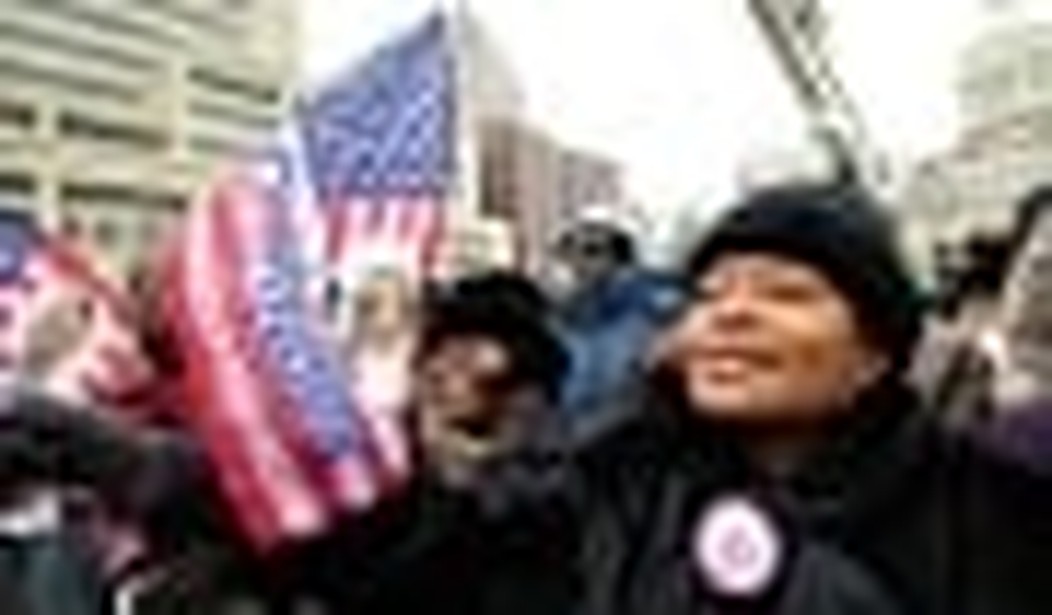The tribute paid to President Obama throughout the inaugural celebrations was often surreal. One newspaper image, of throngs of his admirers ecstatically waving American flags on which his picture had been superimposed, especially captured the wildly unrealistic, quasi-idolatrous way in which many of our fellow citizens view him.
The same can be said of the ubiquitous comparisons of Obama to Abraham Lincoln, which Princeton historian Sean Wilentz last year called “absurd” and “tortured.” “To say that a guy who hasn’t served a day in the presidency is Lincolnian,” Wilentz commented, “is ridiculous. Lincoln didn’t even become Abraham Lincoln, at least as we know him, until [he served and, let me add, was sorely tested, as] president.”
To top off this whirlwind of premature and rash judgments, Obama partisans in the House of Representatives proposed — even before he had taken the oath of office — an amendment to the Constitution which would make a third term possible for him. Known currently as House Joint Resolution 5, this item would start the process to repeal the 22nd Amendment, which established the two-term limit on the presidency.
Such glorification of Obama led even acolyte Paul Krugman to observe during the Democratic primary that his campaign appeared “dangerously close to becoming a cult of personality.” Will this same cultishness continue to envelop the Obama presidency? Perhaps not, as the new president is forced to make Solomonic decisions that perforce offend one constituency or another, and if cracks begin to emerge in the mainstream media’s worshipful bias in his favor.
But it is also possible that this personality cult may endure and fructify, especially if the news media continue to suspend critical analysis of Obama’s long-held views and programs. Also, one can ask whether he will choose to use, to cultish ends, the new, well-funded organization, Organizing for America, which he has fashioned from his vast grass-roots political machinery, and which is described in the Los Angeles Times as “an unprecedented standing political army that will await orders from a president.”
If indeed an Obama cult could enter our bloodstream, it behooves us to look more closely at the political meaning potentially similar cults and their consequences for societies in the past. The key point about personality cults, as summarized at Wikipedia (italics mine), is that in modern times they occur “when a country’s leader uses mass media to create a heroic public image through unquestioning flattery and praise.” Moreover:
- A cult of personality is similar to general hero worship, except that it is created specifically for political leaders. Generally, personality cults are most common in regimes with totalitarian systems of government, that seek to radically alter or transform society according to (supposedly) revolutionary new ideas. Often, a single leader becomes associated with this revolutionary transformation, and comes to be treated as a benevolent “guide” for the nation, without whom the transformation to a better future cannot occur. This has been generally the justification for personality cults that arose in totalitarian societies of the 20th century, such as those of Joseph Stalin and Adolf Hitler.
- Although more uncommon, democratic societies also have examples of political figures who have been noted to have some traits of a cult of personality [for instance, President John F. Kennedy and Argentina’s Juan Perón and his wife Eva].
Here’s hoping and sincerely trusting that Obama will prove not to be an overbearing state-builder, not to have a “tsar” complex. Hopefully the feelings of grandeur that he surely has felt and will feel, as a result of the often unbridled adulation he has received, will not lead him into attempting to institute a personality cult.
Unquestioning praise from many quarters — frequently irrational and ungrounded, and most irresponsibly from the media — was more often than not the response to Obama the campaigner. And his past history of radical associations and thought (which I have explored here and here), as well as much of his campaign rhetoric, does at least suggest that as president he might be predisposed to revolutionary ideas for transforming our society. Perhaps Obama might benefit from the lesson of the first president who famously declined to accede to the temptation of royalty that worried citizens dangled before him.
Democracies are surely not immune to the temptation and dangers of culthood. Let us therefore be watchful. An Obama cult-watch is not entirely out of order.









Join the conversation as a VIP Member